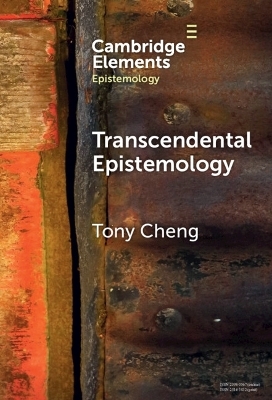
Transcendental Epistemology
Seiten
2024
Cambridge University Press (Verlag)
978-1-009-47863-2 (ISBN)
Cambridge University Press (Verlag)
978-1-009-47863-2 (ISBN)
This Element takes up the challenge of elucidating the nature of transcendental arguments, embedded in the wider context of transcendental epistemology. It is argued that the key premise “transcendental conditional” is synthetic, necessary, and a posteriori.
Transcendental arguments were prominent in Western philosophy, German idealism, phenomenological tradition, and P. F. Strawson's thinking. They have fallen out of fashion because of their associations with transcendental idealism and verificationism. They are still invoked by important figures in the analytic tradition even if the very same tradition has cast doubt on such arguments. The nature of transcendental arguments remains unclear: Are they supposed to be deductive? Are they synthetic or analytic? If they are a priori, how are they supposed to be about the empirical world? What are their relations to necessity, conceivability, and essence? This Element takes up the challenge of elucidating the nature of transcendental arguments, embedded in the wider context of transcendental epistemology. It will be argued that the key premise 'transcendental conditional' is synthetic, necessary, and a posteriori.
Transcendental arguments were prominent in Western philosophy, German idealism, phenomenological tradition, and P. F. Strawson's thinking. They have fallen out of fashion because of their associations with transcendental idealism and verificationism. They are still invoked by important figures in the analytic tradition even if the very same tradition has cast doubt on such arguments. The nature of transcendental arguments remains unclear: Are they supposed to be deductive? Are they synthetic or analytic? If they are a priori, how are they supposed to be about the empirical world? What are their relations to necessity, conceivability, and essence? This Element takes up the challenge of elucidating the nature of transcendental arguments, embedded in the wider context of transcendental epistemology. It will be argued that the key premise 'transcendental conditional' is synthetic, necessary, and a posteriori.
1. Transcendental epistemology introduced; 2. What are transcendental arguments? the history overviewed; 3. What should transcendental arguments be? a hypothesis proposed; 4. Transcendental arguments in action: the hypothesis applied; 5. Roads ahead; References.
| Erscheinungsdatum | 06.02.2024 |
|---|---|
| Reihe/Serie | Elements in Epistemology |
| Zusatzinfo | Worked examples or Exercises |
| Verlagsort | Cambridge |
| Sprache | englisch |
| Themenwelt | Geisteswissenschaften ► Philosophie ► Erkenntnistheorie / Wissenschaftstheorie |
| Geisteswissenschaften ► Philosophie ► Metaphysik / Ontologie | |
| Geisteswissenschaften ► Psychologie ► Verhaltenstherapie | |
| ISBN-10 | 1-009-47863-X / 100947863X |
| ISBN-13 | 978-1-009-47863-2 / 9781009478632 |
| Zustand | Neuware |
| Haben Sie eine Frage zum Produkt? |
Mehr entdecken
aus dem Bereich
aus dem Bereich
die Grundlegung der modernen Philosophie
Buch | Softcover (2023)
C.H.Beck (Verlag)
18,00 €
Buch | Softcover (2023)
Reclam, Philipp (Verlag)
7,00 €


![Was heißt Denken?. Vorlesung Wintersemester 1951/52. [Was bedeutet das alles?] - Martin Heidegger](/media/113619842)